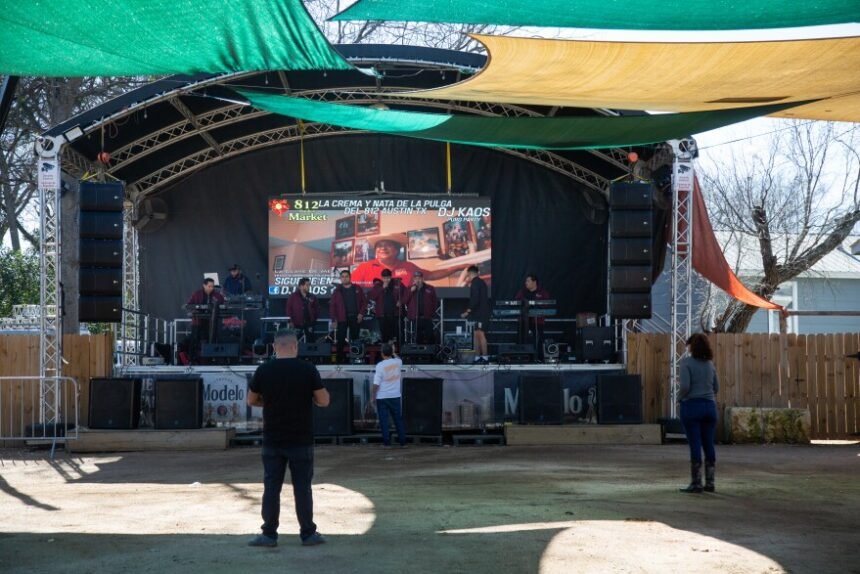Rosa was debating whether to go to work Saturday morning.
“I don’t understand why they don’t want us here,” she said in Spanish. Rosa has lived in Austin for 35 years. Her three kids were born and raised in the city. (KUT is not using her real name because she is undocumented.)
When word spread about immigration authorities detaining people in her neighborhood, Rosa said she was afraid they might show up at the South Austin food pavilion where she works.
She ultimately decided to go in because she couldn’t afford a day off.
“We have to keep moving forward, being careful and taking precautions,” Rosa said. “God will lead the way and I’ll follow.”
On weekends, the food pavilion off Highway 183 is usually packed. The outdoor space has about a dozen businesses and is within walking distance of 812 Outdoor Market, a Hispanic pulga, or flea market.
The line at the taco stand where Rosa works is often more than 50-feet long. But lately, she said, there haven’t been nearly as many customers.
“We all know that the Hispanic community keeps everything running around here; it’s not just one store here or there. We’re here and we’re here to work.”
Esmeralda Suárez
“People don’t want to go out,” Rosa said, noting grocery stores have also been empty in her area. “Two days ago, I went to H-E-B in the evening and it was empty; there weren’t any people.”
Esmeralda Suárez and her husband have owned and operated Barbacoa Santa Rosa, a popular food stand at the pavilion, for 20 years.
“We all know that the Hispanic community keeps everything running around here; it’s not just one store here or there,” Suárez said in Spanish. “We’re here and we’re here to work.”
She said she used this past weekend as a gauge for what to expect in the next few weeks, and she doesn’t like what she’s seeing.
On Saturday morning, a jewelry stand was the only vendor set up near the restaurant. Before Trump’s inauguration, there were about half a dozen vendors every weekend.
“People are afraid of Donald Trump’s policies,” Abdías Domínguez, who runs the stand with his wife, said in Spanish.
Although he’s in the U.S. legally, he said he and his wife still feel the impact of the Latino community avoiding public spaces and skipping work.
“The economy hurts us all,” Domínguez said. “ If they don’t work, who will buy from us?”
A few yards away at the 812 Outdoor Market, there are fewer customers than a month ago. A crowd of three listens to a band playing at the far end of the flea market. In the past, dozens of couples would be dancing to the banda music. But not today.
Vendors say the market’s hallways have also been less busy over the past two weekends.
Greta Díaz González Vázquez
/
KUT News
“Last time, when the same president came [into power], it was also like this,” Angelo Santos said in Spanish. He has been selling chickens, turkeys and eggs at the market for 15 years.
Santos said that after Trump took office in 2016, it took about six months for business to pick up again. He hopes it doesn’t take as long this time.
A few stalls down, Francisco Pérez waits for customers. By 2 p.m., he has sold $200 worth of clothes and huaraches. On a normal weekend, he would have sold between $1,200 and $1,500. But he’s hopeful things will get better.
Business owners at the market have to pay about $300 a month in rent, depending on the size of their stalls, in addition to other expenses. The loss of customers could take a toll.
“It’s really affecting our economy,” Pérez said in Spanish. “People are afraid to go out, to be apprehended” by U.S. Immigration and Customs Enforcement agents.
He said he’s not scared, though. He’s lived in the Austin area for two years now, and he’s saved enough to start a business back in Mexico. Pérez is confident in his skills; he knows how to bake cakes and make pizzas.
“My family is in Mexico,” he said. “Wherever you work hard, you can flourish.”
Pérez acknowledges it’s different for those whose families are also in the U.S. and who have made a life here. But even for Rosa, who has been in Austin for decades, returning to Mexico is a possibility.
Rosa said she’s felt paranoid stepping outside her house and would consider going back if ICE enforcement activities continue in her neighborhood.
“Imagine they take me away, I wouldn’t be able to bring anything with me,” she said. If she left voluntarily, it would be on her terms. “I could bring all my belongings.”
Alejandra Jaime contributed to this story.











